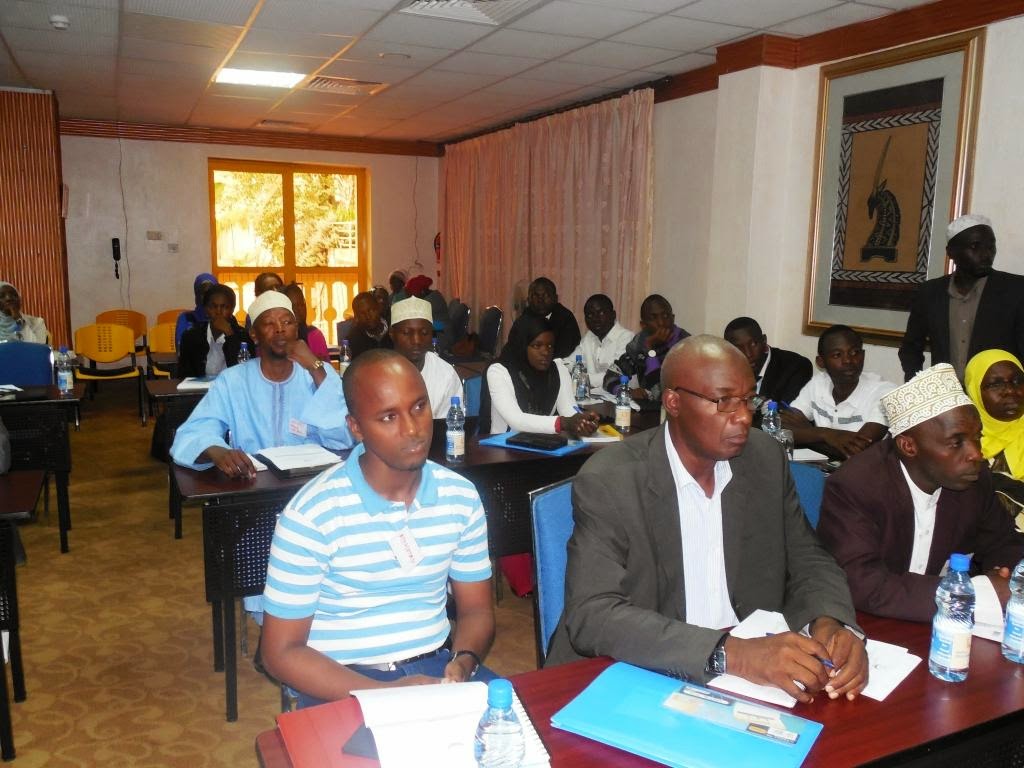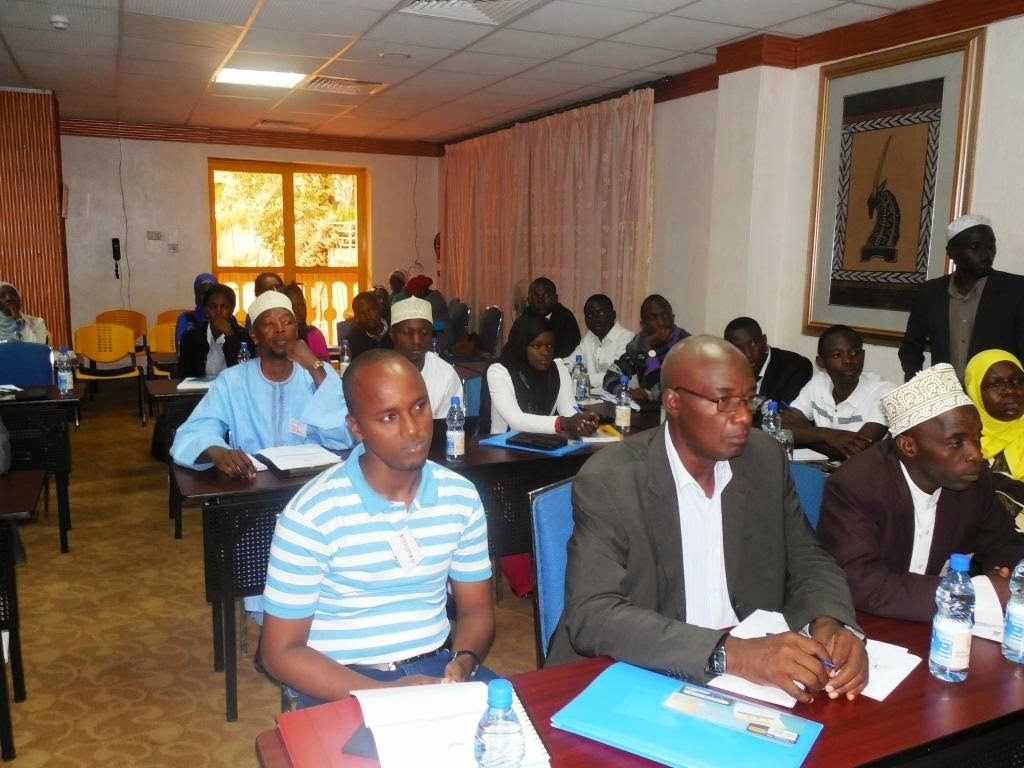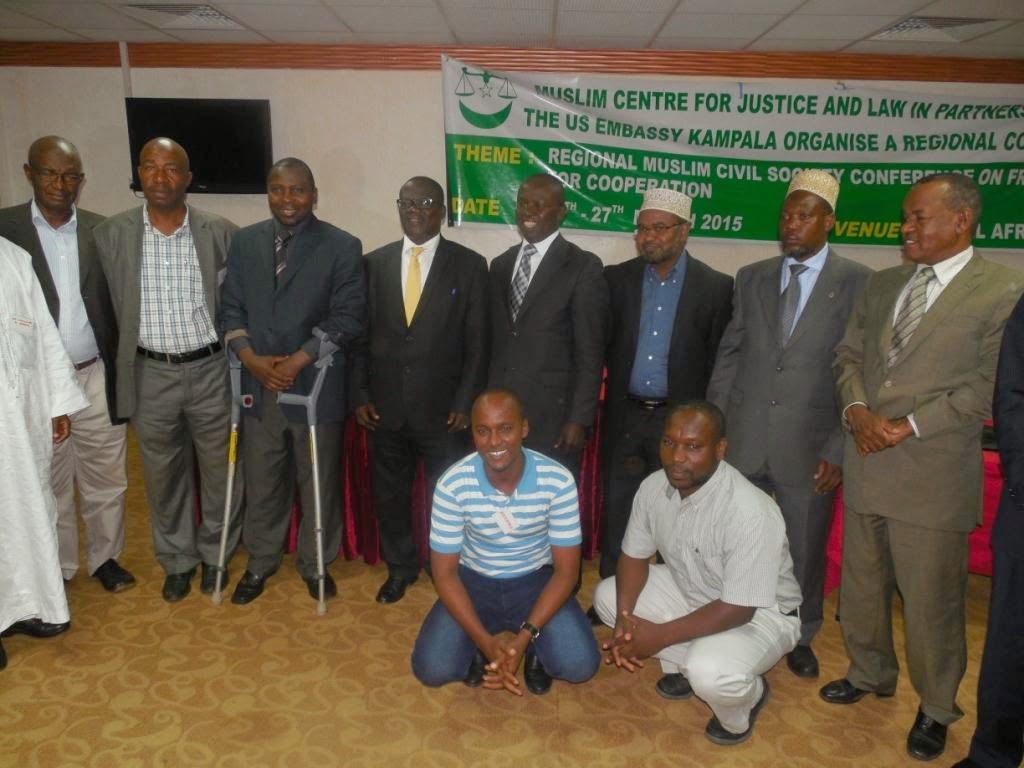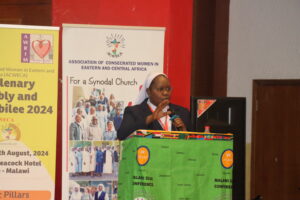UGANDA: Muslim Leaders hold Conference to battle Extremism

Muslim leaders in Uganda held a
regional conference in Kampala from March 26 to 27 on prevention programs and
discussions on countering violent extremism in the East African region.
regional conference in Kampala from March 26 to 27 on prevention programs and
discussions on countering violent extremism in the East African region.
 |
| Participants |
The two day conference, which was
organized by the Muslim Centre for Justice and Law (MCJL) in partnership with
U.S Embassy in Kampala, was held under the theme ‘A Regional Muslim Civil Society
Conference on Framework for Cooperation.’ The conference also attracted
Muslim leaders from neighboring countries including Kenya, Tanzania, Somalia
and Zanzibar.
organized by the Muslim Centre for Justice and Law (MCJL) in partnership with
U.S Embassy in Kampala, was held under the theme ‘A Regional Muslim Civil Society
Conference on Framework for Cooperation.’ The conference also attracted
Muslim leaders from neighboring countries including Kenya, Tanzania, Somalia
and Zanzibar.
The Uganda Episcopal Conference Executive Secretary for Interreligious Dialogue and Ecumenism, Fr. Vincent Karatunga represented the Catholic Secretariat as an invited guest.
The conference was held a few
weeks before the deadly Garissa University College attacks which saw 147 people
killed by Al-Shaabab, an extremist group from Somalia.
weeks before the deadly Garissa University College attacks which saw 147 people
killed by Al-Shaabab, an extremist group from Somalia.
The attack which is the worst in the
East African region in history since the American Embassy Bombings in Nairobi,
Kenya and Dar es Salaam, Tanzania in 1998 when the
actions of terrorists affiliated with Al Qaeda ushered in a new era that caused
the whole world to point fingers at followers of Islam whenever a terrorist
attack takes place. Since then, Muslim activists have spearheaded efforts to
eradicate the perception that Islam is a violent or extreme religion.
East African region in history since the American Embassy Bombings in Nairobi,
Kenya and Dar es Salaam, Tanzania in 1998 when the
actions of terrorists affiliated with Al Qaeda ushered in a new era that caused
the whole world to point fingers at followers of Islam whenever a terrorist
attack takes place. Since then, Muslim activists have spearheaded efforts to
eradicate the perception that Islam is a violent or extreme religion.
The MCJL president, Mr Jaffer
Senganda, the head of Islam and Religious Education at the
Senganda, the head of Islam and Religious Education at the
Department of
Humanities and Language Education, Makerere University in Kampala, Dr Kiggundu
Muhammad, the Kenya Muslim Human Rights Association Mr Yusuf Hussein, Mr Abdi
Abdul Fatah from Somalia and Mr Hamisi Mvindi from Tanzania among others were
some of the facilitators. The Minister without Portfolio (in-charge
of Political Mobilization), Hon. Abraham Byandala was the Chief Guest.
In his speech Mr Senganda told
the gathering that the importance of the conference was twofold. “The first one
is to reignite the Muslim civil society organizations (CSO) in the region to
proactively address issues of concern to the community. The second reason is to
see how our young regional Muslim CSO can synergize, peer learn and cooperate
with each other thus, creating a regional Muslim civil society frame work
cooperation,” said Mr Senganda.
the gathering that the importance of the conference was twofold. “The first one
is to reignite the Muslim civil society organizations (CSO) in the region to
proactively address issues of concern to the community. The second reason is to
see how our young regional Muslim CSO can synergize, peer learn and cooperate
with each other thus, creating a regional Muslim civil society frame work
cooperation,” said Mr Senganda.
He further urged the Muslim civil
society in the EA region to learn from each other’s experience and find the
best practices to combat different societal challenges including violent
extremism, which is currently a major threat. “We need to come out to condemn
violent extremism committed in the name of Islam as it is in Europe and the U.S.
This has painted a negative picture to our dear religion as in most cases the
actions of the minority are over amplified at the expense of the voices of the
majority due to poor organization,” he stated.
society in the EA region to learn from each other’s experience and find the
best practices to combat different societal challenges including violent
extremism, which is currently a major threat. “We need to come out to condemn
violent extremism committed in the name of Islam as it is in Europe and the U.S.
This has painted a negative picture to our dear religion as in most cases the
actions of the minority are over amplified at the expense of the voices of the
majority due to poor organization,” he stated.
Dr Kiggundu attributed poverty,
poor government policies, unemployment and liberalization of the interpretation
of the Holy Koran as the leading causes of the high rise of violent extremism
groups in the region.
poor government policies, unemployment and liberalization of the interpretation
of the Holy Koran as the leading causes of the high rise of violent extremism
groups in the region.
He said, “Since most East
Africans live in poverty, such communities are prone to be used by any
philosophy as long as they get money hence Islam has been mis-used. This is
something not just speculated as we have seen how extremists in the Middle East
recruit young Muslims. Besides, poor government policies both regional and
internal provoke some of these groups. If we can engage our youth and get them
more active, we are leaving them less vulnerable.”
Africans live in poverty, such communities are prone to be used by any
philosophy as long as they get money hence Islam has been mis-used. This is
something not just speculated as we have seen how extremists in the Middle East
recruit young Muslims. Besides, poor government policies both regional and
internal provoke some of these groups. If we can engage our youth and get them
more active, we are leaving them less vulnerable.”
Dr Kiggundu also condemned
Muslims who misinterpret the Koran in the name of religion and urged the
government to shut down Madrasa which practice such things. “The Koran provides
rules and laws that are very clear but some people want to interpret it upside
down. All we do must be done in the name of God but not turn religion into evil
faith. If we can get ourselves together we can fight this because it not
written anywhere in the Koran to kill your neighbor,” he explained.
Muslims who misinterpret the Koran in the name of religion and urged the
government to shut down Madrasa which practice such things. “The Koran provides
rules and laws that are very clear but some people want to interpret it upside
down. All we do must be done in the name of God but not turn religion into evil
faith. If we can get ourselves together we can fight this because it not
written anywhere in the Koran to kill your neighbor,” he explained.
Hon Byandala requested the
gathering to be on the look-out and asked the leaders to also target online
radicalization since it could be the most effective strategy for Muslims aiming
to combat extremism.
gathering to be on the look-out and asked the leaders to also target online
radicalization since it could be the most effective strategy for Muslims aiming
to combat extremism.
By
Jacinta W. Odongo; Media Officer, Uganda Episcopal Conference
Jacinta W. Odongo; Media Officer, Uganda Episcopal Conference



